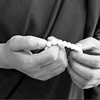  |
t h e 9-10-3 p r o j e c t > g
y a l s t e n c h o e t s o On September 27, and October 1, 1987 sacrificing their precious lives, the monks of Drepung and Sera organised rallies to regain Tibetąs lost freedom. The rallies were attended by hundreds of people. I was deeply inspired by their movement, and inexpressible patriotic feelings were sparked within me. I gladly decided to join the freedom movement. On December 19th, five nuns from Gargon nunnery and I chanted Free Tibet slogans. Consequently, I was arrested and imprisoned during which I was subjected to severe beatings. Further, electric shocks were forced on various parts of my body. A month and three days later the Panchen Lama came to Tibet from China. He granted general amnesty to 87 political prisoners who were consequently released. Fortunately, I was among the 87 prisoners, so I returned to my nunnery. Before long on April 17, 1988, I participated with 13 nuns from our nunnery chanted slogans and distributed letters in Lhasa. Subsequently, we were arrested and without interrogation the Chinese authorities beat us ruthlessly. I received many more beatings because it was my second protest. The Chinese accused me of spearheading the sloganeering. Merciless beatings rendered me unconscious. When I regained consciousness I found myself bleeding from the head and nose. Other nuns were bleeding too. From 9 in the morning until 5 in the evening we were subjected to interrogation, intense beatings and torture. This is a typical day in a Chinese jail. For more than three months the days passed as described above after which most of my jail-mates were released. However, three others, including myself, were not set free. We continued to be beaten and tortured. About three months later two of my jail-mates were released. Gyaltsen Choekyi and I continued to remain in jail. Every day we were taken to the court and the investigation office for interrogation and torture. This went on for about eleven months after which we were set free. I returned to the nunnery. Thereafter, from March 3, 1989, for three days there was a massive protest for independence at Lhasa which I participated in. On March 5, at around 4pm martial law was imposed on Lhasa city. No one was allowed to exit Lhasa and those who dared were arrested and jailed. My jail-mate and I were trapped in such a situation. Luckily, a patriotic family gave us a safe haven. We had to change rooms and sometimes we had to hide in the dark with no windows. We endured this hardship for 25 days. My jail-mate was given shelter by Mrs. Lhakpa. Later, we were able to return to the nunnery with the help of Mr. Rigzin and Uncle Tsazur who are now in exile in Dharamsala. A committee was constituted, the members of which are mostly Chinese. Its goal was to launch Śpurgesą in the monasteries whereby we were required to be patriotic towards the motherland of China. Further, they forced us to submit letters of regret for the folly of taking part in political activities, proclaiming that in the future we wouldnąt become involved in political campaigns. I not only refused to comply with the dictate but I frowned at the Chinese. It was the time of the conferment of the Nobel Peace Prize to His Holiness the Dalai Lama. The Chinese ordered us forcibly not to show gaiety, but we defied their order and celebrated the event. Then, in 1990, one night around 11pm, the Chinese arrested eight nuns including me. It was the third time I had been involved in political activity. In jail I was beaten much more harshly than previously. Worse, they had new torture devices in Tibet, so I suffered unspeakable persecution at the hands of the Chinese. Around six months later, I was expelled from the nunnery and was handed over to the regional police. I thus remained under the surveillance of the regional police for nearly a year. Due to unimaginable beatings and torture during my imprisonment I was suffering from chronic ailments. I went to Taktser Sher Medical Centre for treatment, but it proved futile. On the strength of the recommendation letter from the regional police, I was treated at the Lhasa hospital. I have recounted here the story of inhumane beatings, persecution, harsh labour and the very poor quality food that we were subjected to in the Chinese jails. My initial goal was to serve my two teachers at the nunnery and help fellow prisoners, but due to political circumstances, my aim couldnąt be realized. I had to leave my two teachers and parents, and flee my country Tibet. The following people have extended help for me during my flight into exile: my father, my two teachers, Rigzin lag, and Mrs. Lhakpa. Because of their help I was able to reach Dharamsala. On October 13, 1991 I had an audience with His Holiness the Dalai Lama. I felt that I must have created sufficient good merit to be able to see and hear His Holiness speaking. I
worked at the Reception Centre for four years . My educational standard
was very low, so I took a leave of absence and I am currently studying
at the Dolma Ling Nunnery . . . . |